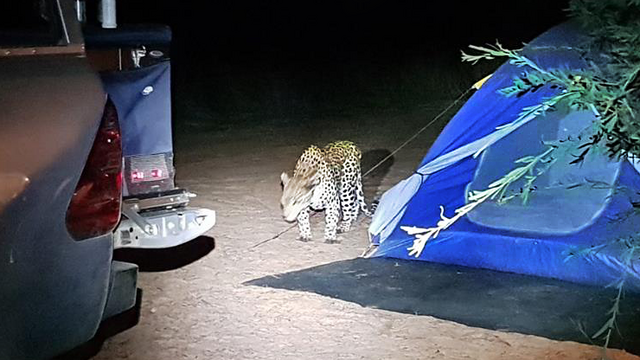Leopard Attacked Camper in Kgalagadi

Earlier this month, a family were out camping at Matopi 1, a campsite in the Kgalagadi.

This campsite is unfenced, meaning, any animal can come and go as it pleases.
This can lead to some incredible experiences, but can also be a recipe for disaster.
This family that set up camp were just finishing off their braai when one of them went off "for a leak" a little way away from the site when he spotted a leopard lying 50m away.

The leopard apparently paid no attention and just remained calmly still while the family watched him.
The leopard seemed to walk off, after losing interest, and the family went to sleep.
Just after midnight, the husband woke up to his wife screaming in terror as the leopard they saw earlier was tearing into her leg, trying to drag her out the tent.

The husband dived towards the leopard and wanted to poke the leopard's eyes, but couldn't reach. The other friends that were camping next to them, started hitting the leopard with a shovel, which caused the leopard to flee.
The husband carried his bleeding wife to the car and drove for 11.5 hours to Upington, where a surgeon took immediate care of his wife.

The wife suffered a crushed heel requiring screws and severe wounding requiring plastic surgery.
Corlette provided us with an update:
"I asked the family who were the ones camping when the attack happened how the Leopard behaved and I was told that this Leopard was far too relaxed amongst people.

Rubbing himself against the vehicle etc...
They tried to chase him away more than once, but he would go off only to return again and again.
They felt very uncomfortable having this Leopard around and it did not matter what they tried it, kept coming back."

"Clearly this is not normal behaviour and it can only be due to people having fed the leopard in the past. If the family wants anything out of this situation, it is to educate future safari-goers to try and never leave food out or to feed animals that are walking past the camp. This causes animals, including predators, to get used to humans in close proximity and can cause fatal situations in the future.
This occurrence cannot just be forgotten - we want to ensure that this will NEVER happen again."
